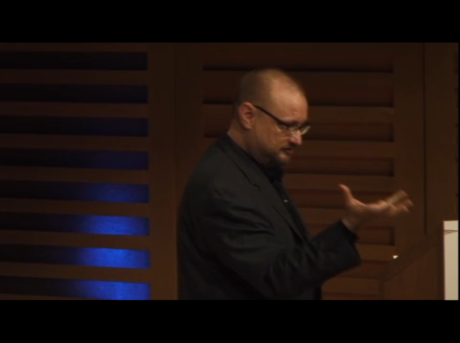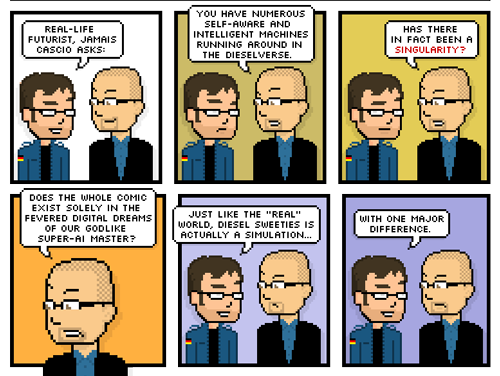[Dale Carrico, at Amor Mundi, wrote a thought-provoking piece on whether geoengineering should be considered "futurological greenwashing," covering aspects including the fuzziness of the concept, who's behind efforts to promote the concept, and its non-democratic nature. Chris Mooney (the original trigger for Dale's piece) wrote one response; here's mine.]
Not everyone who writes or speaks about geoengineering has the same perspective, even those of us who approach it from a "futurological" point of view. But as geoengineering has moved from fringe fantasy ("space mirrors") to sober consideration, one thing has become abundantly clear:
Geophysics doesn't care about politics.
Climate systems are slow-change systems; we could stop putting any carbon into the atmosphere right this very second, globally and totally, and still see another 20-50 years of warming due to the carbon that's already there, and the thermal inertia of heat accumulated in the oceans. That translates into at least another 1° C of warming guaranteed, and potentially another 3° C. And 3° C translates into catastrophe.
There's no doubt that continuing to spew greenhouse gases will make things even worse, so don't read that as a "nothing we do matters" argument. But it's very important to recognize that doing all of the right things, for all of the right reasons, may at this point no longer be sufficient to hold off disaster -- a disaster that will hurt most the people least responsible for its causes, least able to survive short-term shocks, and least able to adapt to long-term changes.
So we need to ask ourselves what our options are to minimize harm. Unfortunately, the list of what's technically feasible and what's ethically palatable don't necessarily line up -- and some choices that are both technically and ethically attractive (such as radical emission reductions) are very likely insufficient at this point. So what do we do? We can't just hand-wave that question away: I increasingly believe that this will be the defining question of how we deal with global warming.
The definition of geoengineering that I've been using for quite awhile is "intentional intervention in geophysical systems in order to alter the global climate." This comprises the three key elements: purpose -- geoengineering is something done willfully and with climate modification as the primary goal; scale -- geoengineering focuses on manipulation of complex geophysical processes; and scope -- the results aren't limited to or focused on a particular locality. This helps to clarify both what is and isn't geoengineering. Spewing carbon into the atmosphere via industry and transportation is certainly global and has complex effects, but the primary goal isn't to change the climate; cloud-seeding is intentional and complex, but local; planting trees is intentional and has a (very small) global impact, but is (arguably) not systemic manipulation.
A science-fiction parallel that might illuminate is to think of it as terraforming the Earth. And yes, that's a massive and fraught endeavor.
This definition does illuminate one surprising benefit, however. Because geoengineering operates at a global scale, efforts by the rich to save their own skins through (say) sulfate-injection to keep temperatures down would potentially do more to protect the poor nations than would more locally-focused adaptation efforts.
Dale is absolutely right that geoengineering should be considered and (if embarked upon) managed democratically. The political and ethical questions that geoengineering prompts have long been the focus of my own writing on the subject -- hell, it's the entire reason I wrote Hacking the Earth. And there may be ways of handling it that are reasonably transparent and democratic; see A Survival Guide to Geoengineering, a piece I wrote for the University of Minnesota's Institute on the Environment, or the video of my talk "Hacking the Earth Without Voiding the Warranty", to see some of the guidelines for trying to keep a democratic handle on something this massive.
But here's the ugly truth: nature doesn't care about democracy, or who's right, or what's fair. And because of the slow-change aspect of climate, we can't wait until the worst effects are upon us to make a decision -- by then, it would be far, far too late. The scenario we may be faced with is one where doing something for the wrong reasons, run by the wrong people, may still save more lives than holding out for a more appealing option.
This doesn't mean geoengineering is the right thing to do, or is wise, or will be cost-free -- only that there's a disturbingly high possibility that it's the least-bad of a set of very bad options.




